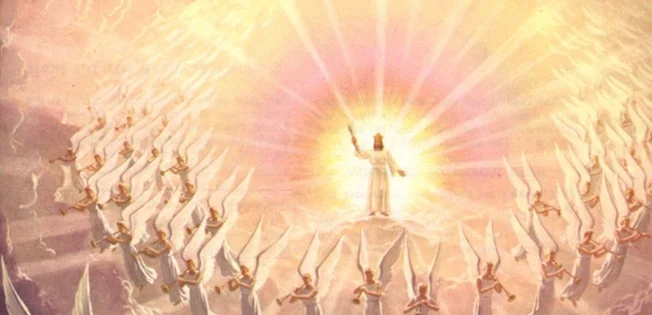 A strong expectation of the end of time can make the continued passage of time an embarrassment. Even worse, it can lead to giving up on the expectation. Embarrassed Adventists and disillusioned Adventists are not an unknown species. How then are we to sustain expectation in the face of apparent delay?
This question has pressed itself upon me over the last few years, coming at me in bits and pieces and at the oddest of times--not a sustained reflection, but more an existential reflection that has arisen out of the experiences and questions of daily life. That is how I would characterize my end of the world pondering.
A strong expectation of the end of time can make the continued passage of time an embarrassment. Even worse, it can lead to giving up on the expectation. Embarrassed Adventists and disillusioned Adventists are not an unknown species. How then are we to sustain expectation in the face of apparent delay?
This question has pressed itself upon me over the last few years, coming at me in bits and pieces and at the oddest of times--not a sustained reflection, but more an existential reflection that has arisen out of the experiences and questions of daily life. That is how I would characterize my end of the world pondering.
At the same time I must admit that my scattered reflections have been possessed of an undergirding concern. It has seemed to me that just when we should be anticipating more than ever long awaited events, then either distraction or lethargy seizes us. Many times I have said to my wife, and only those who are readers of Lewis' Narnia books will understand this, “It is time for Puddleglum to stick his feet into the fire.” If there were ever a time when we cannot afford to be caught spiritually napping, certainly it is now.
But I must make clear that this is not to give expression to an overweening personal concern. It should not be primarily a self-concern which fuels a desire to stay awake, but rather a concern for the glory and truth of God and for the salvation of those who do not yet know Him. Indeed self-concern is only proper when it is a concern to not fail of engagement with these larger realities, which are the true and proper concerns of humans anyhow.
But back to our question: how do we sustain expectation, when what we have been expecting seems so long in coming? In the light of this question a new thought came to me, out of the blue, as I drove home from the woodshop to eat my lunch. My thought had to do with the way we think about time, especially the time of His coming.
The End of Time or the Time of the End?
We cannot think of the coming of Jesus in terms of a specific point in time. He himself told us this when he said, “No man knows the day, nor the hour.” Jesus’ statement makes this particular waiting unique in the annals of salvation. The faithful in Noah's time knew not only that an end was approaching, but they also knew the time of that end. One hundred and twenty years had been granted and signified in the very year of fulfillment by the death of Methuselah. Abraham was told the year that his descendants would be delivered from bondage. The exiles were told by Jeremiah the number of years their captivity would continue. And finally, Daniel was given insight as to the very year that Messiah would accomplish his greatest work, the work of blood atonement. In all these cases men and women could point to a specific time. Specificity had been given them. The “day and hour” were known.
But the last great prophecy is different. The long stretch of the 2300 days does not bring us to the end of time, but only to the time of the end. And that is why we must think of time differently. But how then are we to think of it? What is involved in knowing that we are in the “time of the end” that makes it different from knowing the “end of time”?
The answer to that question, I have come to believe, is this: Knowing the “end of time” would focus our attention upon a specific point in time and the event which will take place at that point, namely the second coming of our Lord. But not knowing that point and knowing only that we are in the “time of the end” focuses our attention on essential developments which will culminate in that end.
I can still remember Jon Paulien in seminary class emphasizing the apparent oddity of Satan going “off” to make war. The Greek word that we translate “off” literally means “he left,” “he departed” (Revelation 12:17). So we have the idea, “Satan went away—he departed—so as to make war.” What seems to be pictured is a strategic retreat, a retreat for the purpose of re-grouping and re-launching the offensive anew. It has been my growing conviction for some time now that the Enlightenment was the start of this new offensive, Satan's counterattack to the Reformation.
That Satan should be checked and have to begin again along a new line is nothing new. God has checked him before. Only this time God has revealed to us that this will be the last time. This is the last time that Satan will rearm himself. This is the last time he will engage in a new offensive. The deceptions and distortions launched by the thinkers of the Enlightenment will not be replaced by yet another system. They will only come more and more to fruition. And this insight gives focus and shape to our “waiting.” We do not wait blindly for a mere point in time. We wait and watch the development of an identifiable system of thought, which as it grows into full fruition signals the approaching end. Even unbelievers have recognized this truth. The erudite and learned George Steiner, who surveys the philosophical and artistic state of western civilization in his book, Grammars of Creation, makes the startling statement, “There are no new beginnings.”
And so watching the development of the outlook and the way of life rooted in the Enlightenment is somewhat like watching a drop of water on a leaf. Swelling with the falling mist it moves recognizably towards the point when it will burst and break away. You know this will happen, and the more it swells the closer you know that moment to be, even though you do not know the exact moment it will occur. And so we see the fullness accumulating, though we know not the time of its end.
But then again, this waiting period is not one-sided. God has also engaged. In 1844 He initiated the divine movements that would culminate in final victory, sifting, testing, judging, lifting up truths essential for the times, calling people out, calling them to move higher, to find the true foundations, to give witness to the true pattern and to grow in it themselves.
And we as Adventist have been privileged to be a part of this waiting period, to have been at the front of this movement. But I sometimes fear that we have been content with merely mapping events, giving shape to an eschatology identifiably Adventist, and patting ourselves on the back that we have it all figured out. In such a scheme events can only be waited for, engendering a kind of passivity, centered in self-concern, spiced at times with wide-eyed apocalyptic fervor.
With this attitude we should not be satisfied. We must dig deeper. We should go back again and again to the books of Daniel and Revelation, not so much to map out events, as to be made vitally aware of the spiritual issues which are at the root of present conflicts. Satan is working through his agents to redefine the whole playing field of life—spiritually, intellectually, culturally—to bring men and women to the point where biblical faith is no longer accessible to them. And against these movements we can and must engage or be swept away ourselves in the growing flood.
Disappointed with delay? Distracted by the seeming inattention of God—the silence—as the world increasingly slides into a moral pit? We should shift our focus. That which began in the Enlightenment on one side, and in 1844 on the other continues to develop apace and in every new development we may find, not only the confirmation of His soon coming, but also the call to engagement for the sake of a world that is fast losing its grip on the truth. There is no time to think of delay and to collapse into distraction and disappointment. Even now all things move towards the climax.





